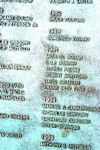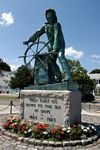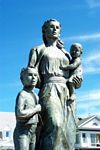Home > Gloucester > The Memorials
The Fishermen’s Memorial and the Fishermen’s Wives Memorial (Gloucester Harbor)
Location, History, and Legends
Location

The Fishermen’s Memorial and the Fishermen’s Wives Memorial are statues located on the Stacy Boulevard Esplanade near the intersection of routes 127 and 133. The Fishermen’s Wives Memorial is located on the west side of the drawbridge over the Blynman Canal (the Cut) right by the intersection of routes 127 & 133, and the Fishermen’s Memorial is located on the east side of the bridge. Both memorials are on the west side of the outer harbor near the opening to the inner harbor.
History and Legends
 The Fishermen’s Memorial, also known as “The Man At The Wheel,” was commissioned as part of the celebration of Gloucester’s 300th anniversary in 1923. The base of the statue was placed at the site that year, but the actual statue was not unveiled until 1925. The statue is a tribute to the 10,000 Gloucester fishermen who have lost their lives at sea over the centuries and a reminder that fishing is our country’s most dangerous occupation. The statue is the work of sculptor Leonard Craske (1877-1951) and is based on a 1901 painting by Gloucester artist A.W. Buhler. The image of the man at the wheel was adopted in 1904 as the logo for Gloucester’s Gorton Fisheries, and the national distribution of their products combined with the popularity of the statue have made “The Man at the Wheel” a well-recognized icon of the courage and fortitude of Gloucester fishermen. Inside the base of the statue is a time capsule containing 47 items representing Gloucester history and culture in 1923, and inscribed on the statue is a verse from the 107th Psalm: “They that go down to the sea in ships.” The Gloucester Fishermen’s Memorial was added to the National Register of Historic Places in 1995.
The Fishermen’s Memorial, also known as “The Man At The Wheel,” was commissioned as part of the celebration of Gloucester’s 300th anniversary in 1923. The base of the statue was placed at the site that year, but the actual statue was not unveiled until 1925. The statue is a tribute to the 10,000 Gloucester fishermen who have lost their lives at sea over the centuries and a reminder that fishing is our country’s most dangerous occupation. The statue is the work of sculptor Leonard Craske (1877-1951) and is based on a 1901 painting by Gloucester artist A.W. Buhler. The image of the man at the wheel was adopted in 1904 as the logo for Gloucester’s Gorton Fisheries, and the national distribution of their products combined with the popularity of the statue have made “The Man at the Wheel” a well-recognized icon of the courage and fortitude of Gloucester fishermen. Inside the base of the statue is a time capsule containing 47 items representing Gloucester history and culture in 1923, and inscribed on the statue is a verse from the 107th Psalm: “They that go down to the sea in ships.” The Gloucester Fishermen’s Memorial was added to the National Register of Historic Places in 1995.
Perhaps the best known names on the plaques at the Fishermen’s Memorial belong to the captain and crew of the “Andrea Gail,” who have been immortalized in Sebastian Junger’s The Perfect Storm (New York: Harper 1998). In his book Junger describes the last voyage of this sword fishing boat and also tells about the history and development of the fishing industry in Gloucester. The feature film version of the book vividly brings to life the crew’s courage and fortitude and shows why fishing is so dangerous.
 The idea for a memorial to the wives of Gloucester fishermen has been around since the 1930's. Leonard Craske, creator of the Gloucester Fishermen's Memorial, envisioned a sculpture of a woman as a companion piece. His model, displayed at the Cape Ann Museum, shows a woman clutching a bundled child, her gesture reminiscent of a ship's figurehead. Craske's proposed inscription was, "They also serve who only stand and wait." Years later, the renowned sculptor Richard Rechia (husband of Dogtown poet Kitty Parsons) designed a sculpture called, "The Widow of the Fisherman," a melancholy figure of a woman stooping to lay a wreath of flowers in the sea.
The idea for a memorial to the wives of Gloucester fishermen has been around since the 1930's. Leonard Craske, creator of the Gloucester Fishermen's Memorial, envisioned a sculpture of a woman as a companion piece. His model, displayed at the Cape Ann Museum, shows a woman clutching a bundled child, her gesture reminiscent of a ship's figurehead. Craske's proposed inscription was, "They also serve who only stand and wait." Years later, the renowned sculptor Richard Rechia (husband of Dogtown poet Kitty Parsons) designed a sculpture called, "The Widow of the Fisherman," a melancholy figure of a woman stooping to lay a wreath of flowers in the sea.
The Gloucester Fishermen's Wives Association was not interested in either characterization of the role of women in the fishing industry. Seeing themselves as doing everything but sitting around waiting, the Wives determined to commemorate their contributions, both in the past and in the future they work so hard to secure. In 1996, sculptor Morgan Faulds Pike, the winner of the GFWA's international design competition, signed a contract to build her vision of The Gloucester Fishermen's Wives Memorial - a woman holding a small child in her left arm with her right hand on the shoulder of a standing child.
The decades long dream of Gloucester Fishermen's Wives Association founder Lena Novello and president Angela Sanfilippo became a reality in August 2001, when the Fishermen's Wives Memorial was unveiled and dedicated. Morgan Faulds Pike's bronze sculpture stands 12 feet high on its base, a boulder of natural granite. It took two years to complete the piece, once funds were raised. [A depiction of the lengthy building process is on the GFWA's website.] The inscription around the base of the sculpture reads: "The wives, mothers, daughters and sisters of Gloucester fishermen honor the wives and families of fishermen and mariners everywhere for their faith, diligence, and fortitude."
Visitors to these statues will find the names of hundreds of Gloucester fishermen and their wives commemorated at the sites. There is no one legendary fisherman or fisherman’s wife here. At the statues, visitors will pause to remember and consider the names of the fishermen and their wives who are not legend, but whose legendary suffering and sacrifice are part of the painful human toll of the fishing industry.